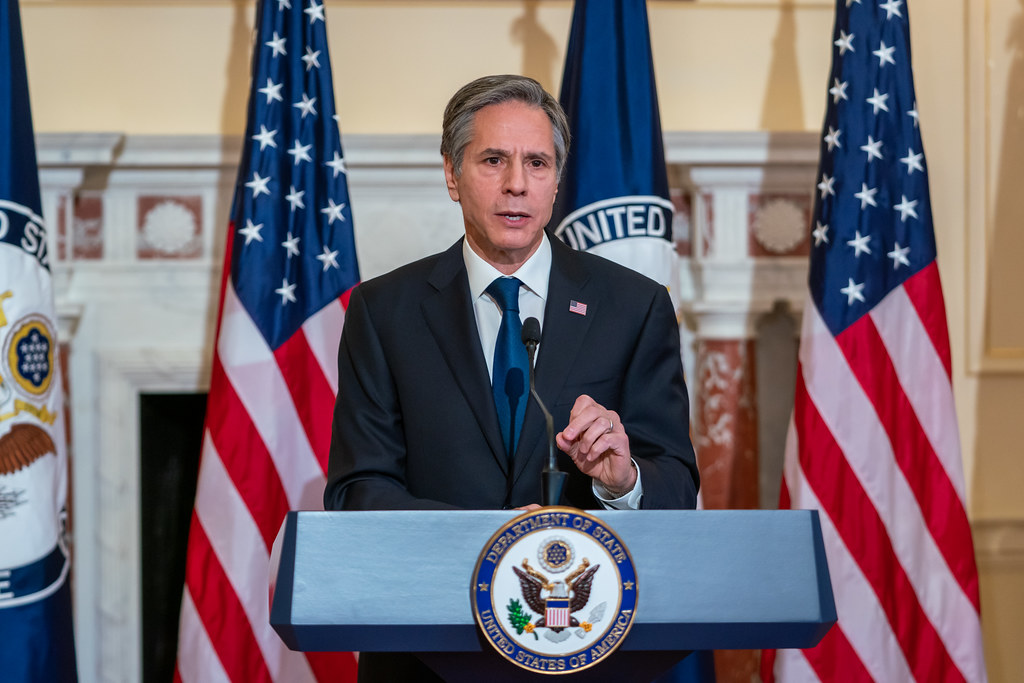Washington: 'Iran has moved backwards, we are not close to reviving nuclear agreement'
US Secretary of State Anthony Blinken announced on Friday that Iran's latest response to reviving the agreement on its nuclear programme is a step "backwards", stressing that Washington will not rush to rejoin at any cost

Estimated reading time: 4 minutes
European negotiators appeared to be progressing towards reviving the 2015 agreement with Iran, largely agreeing to the text of the final proposal.
However, the level of optimism dropped when the US sent its response, to which Iran responded.
Blinked told reporters: "In past weeks, we've closed some gaps. Iran has moved away from some extraneous demands – demands unrelated to the JCPOA (Joint Comprehensive Plan of Action) itself."
"However, the latest response takes us backwards. And we're not about to agree to a deal that doesn't meet our bottom-line requirements," he added.
"If we conclude a deal, it's only because it will advance our national security," noted Blinken.
US President Joe Biden supports reviving the agreement that will ease sanctions imposed on Iran and enable it to resume selling its oil worldwide in return for major restrictions on its nuclear programme.
Donald Trump, Biden's predecessor, withdrew from the agreement and imposed new sanctions on Tehran.
Diplomats point out that Iran has abandoned its request to remove the Revolutionary Guard Corps from the US list of foreign terrorist organisations, which was a major point of contention.
However, there are still contentious issues, perhaps the most prominent of which is Iran's insistence that the International Atomic Energy Agency (IAEA) close the investigation into three undeclared sites suspected of having witnessed nuclear activities in the past.
During his visit to Brussels, Blinken held online meetings with his counterparts in Britain, France and Germany, who are still parties to the agreement.
US sanctions on Iran
In a different context, Washington imposed sanctions on the Iranian Ministry of Intelligence and National Security and its minister, Esmail Khatib, after it revealed that Tehran was behind an unprecedented cyber-attack targeting Albania, a member of NATO.
The Albanian government said that Iran launched the attack on 15 July to paralyse public facilities and access data in government departments.
The US reported that Iran's Ministry of Intelligence and National Security was behind the attack, which Albania asserted was a failure and that no permanent damage was caused.
"Iran's cyber-attack against Albania disregards norms of responsible peacetime state behaviour in cyberspace, which includes a norm on refraining from damaging critical infrastructure that provides services to the public," said Under Secretary of the Treasury for Terrorism and Financial Intelligence Brian E. Nelson.
The US Treasury confirmed that the Iranian ministry runs several networks for electronic espionage, hacking and ransomware.
The US Treasury mentioned one Iranian group, known as MuddyWater, which it said has been waging cyber campaigns since 2018, exploiting loopholes in foreign networks to gain access to sensitive information and using ransomware.
The treasury noted: "As recently as November 2021, MuddyWater was assessed to be involved in a cyber campaign targeting Turkish government entities and delivering documents containing malware likely through spear-phishing emails to gain access to victims' systems."
In addition to targeting facilities and infrastructure, the hackers are responsible for leaking documents from the Tirana government and personal data on Albanian citizens.
On Wednesday, Albania cut diplomatic ties with Tehran due to the cyber attack.
Source: Middle East Monitor under CC BY-NC-SA 4.0
What's Your Reaction?
























